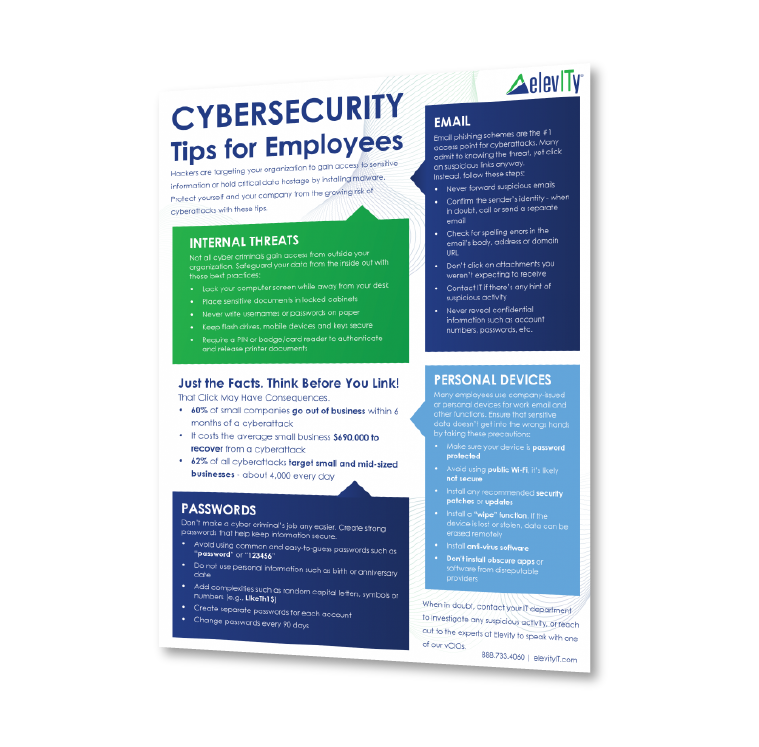Cell phones are so integral to every facet of our lives that we don’t even really call them “cell phones” anymore. Whether it’s a smartphone, tablet or laptop, today’s mobile devices should be protected just as comprehensively as desktop computers. Cybercriminals want to break into anything with an internet connection to take what isn’t theirs.
That’s why in today’s fast-paced, always-on and remote-work world, it’s critical to put protective measures in place for all devices — including those used for conducting business on the go. You can’t always take the same approach to mobile security as you do with desktop computers. What are some of the mobile security best practices for businesses to implement? Read ahead for a list of 10 considerations.
10 Ways to Boost Your Mobile Security
1. Use Work Devices for Work
Let employees keep their own personal devices for their personal uses, and equip them with a company-approved and secured mobile device they can use strictly for business purposes. This helps keep you in control of that device without barging into an employee’s personal matters, and helps prevent an employee’s personal use from compromising security. Having this clean divide between work devices and personal devices can go a long way in keeping assets and corporate data protected.
2. Ensure Physical Security
Unlike a desktop computer that is set up inside an office at one secure location, mobile devices are carried out into the world and are that much more vulnerable. A phone in a salesperson’s pocket or a laptop in a portable carrier can be lost or stolen easier than we may want to realize, and a device falling into the possession of anyone who isn’t the authorized user is automatically falling into the wrong hands, regardless of intent.
This is a baseline security for any mobile device. Make sure every user is fully aware and protective of their mobile device when they take it with them, even in their own home. Ensure laptops and tablets have protective sleeves or cases to guard against damage from an accidental drop. Coach everyone on how to disguise or hide a mobile device if it’s left in their vehicle so it doesn’t scream out to opportunistic criminal passersby.
3. Use Remote Locking and Data Wiping
Virtual Desktop Infrastructure (VDI) is a great cybersecurity tool that lets authorized users securely connect to an organization’s networks and access their assets remotely through any internet connection from almost any device and location. The secure aspect of VDI protects company information from the get-go, ensuring no unauthorized access is obtained.
There are many VDI providers out there, but we recommend Microsoft Azure.
4. Enable Strong User Authentication Protocols
At a minimum, mobile devices should be password protected or locked with a solid PIN. Some devices offer stronger protection, like biometric authentication, that asks for a known and authenticated fingerprint or facial recognition. For laptops, enable two-factor authentication, where a user is sent a code to their mobile phone that they then must enter into the laptop, helping to confirm both devices are in the right hands.
5. Keep Operating Systems Updated
No operating system is perfect. Even the most secure and bug-free operating systems eventually become predictable and easy to manipulate for cybercriminals. That’s why businesses must ensure all their devices are running the most current version of their operating systems.
Learn More: The 5 Best Cybersecurity Risk Assessment Tools
6. Limit the Use of Apps
Cybercriminals sneakily infiltrate applications and app stores on a regular basis to try to nudge their way into a device and install spyware, ransomware or other malicious software. Limit the apps used on each device to what is strictly necessary to conduct business, and keep those apps current as well. Like operating systems, legitimate apps can also be made vulnerable if not updated with the latest security.
7. Never Use Public Wi-Fi
When on the go, it’s tempting to log into the most convenient Wi-Fi network that’s currently available. But that comes with immense security risks. If someone traveling for business needs to make a stop at the auto shop for some quick maintenance on their vehicle, they may want to finish some tasks while waiting. An auto shop Wi-Fi network named “Auto Shop Guests” with its “12345” password isn’t exactly hard for criminals to access, so it’s best to limit Wi-Fi use to secure and authenticated networks.
8. Consider a Mobile VPN
Virtual private networks, or VPNs, can add another layer of privacy protection for mobile devices, which is particularly useful when not using company-run networks. A password-protected Wi-Fi network at an employee’s home, while miles better than a public network, still likely won’t have the full security measures of a company network. A reputable VPN can help shield sensitive information.
9. Use the Cloud
We’ve said it before and we’ll say it again: The cloud is a convenient way for authorized users to get work done from just about any device or location, which is an ideal method for workers on mobile devices. Using Microsoft 365 or Google Workspace keeps work online rather than relying on hardware storage — which means if a device is lost and needs its data wiped, work done on the cloud won’t be lost.
10. Work with a Technology Management Provider
Your business doesn’t have to go it alone in the fight to protect your assets and sensitive data against cybercriminals. No matter the size of your company, you can partner with a technology management provider like Elevity to take the reins of your IT infrastructure or, if you already have your own internal IT team, join forces and fill in some of the gaps.
Fully managed technology services are ideal for businesses with fewer than 100 employees, while co-managed technology services are better suited to larger businesses. Elevity provides both, and each one entails our 4S approach to technology management: Strategy, Security, Solutions and Support. With our modern, evolved approach to technology management, we can do the heavy lifting when it comes to securing your mobile devices.
Empower Your Employees
Are all your employees well-versed in cybersecurity measures? Help empower their knowledge in how to protect themselves and the company from deceptive cybercriminal tactics and turn unsuspecting employees into skilled scam detectors. We’ve developed a helpful infographic that addresses such important topics as email security, internal threats, personal devices and more. Click the link below and fill out the form to access your free copy today.





%20cropped.jpg)




